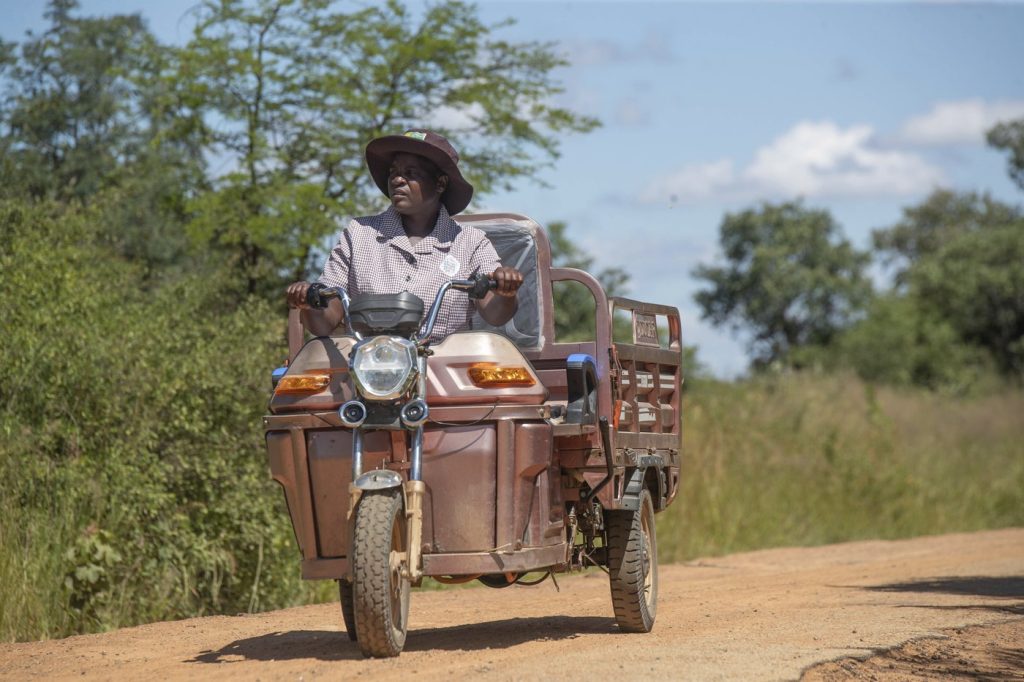WEDZA, Zimbabwe (AP) - Anna Bhobho, a 31-year-old housewife from rural Zimbabwe, has transformed her life from being a silent observer in her household to becoming a significant agent of change in her village, largely due to her ownership of an electric tricycle. In a society characterized by deep patriarchal norms, where women have historically been excluded from economic activities such as public transportation, the introduction of electric three-wheelers is beginning to shift these dynamics.
The electric tricycles, named "Hamba," which means "go" in Ndebele, are powered by solar-charged lithium-ion batteries. Since their pilot launch by a local startup, Mobility for Africa, in 2019, these vehicles have been leased to groups of women for a nominal fee of $15 a month. As a result, women like Bhobho can now own the tricycles through a lease-to-purchase program, enabling them to contribute financially to their households.
"My husband now looks up to me to take care of a large chunk of expenses, including buying furniture and other assets," said Bhobho at a local market in Wedza district, located approximately 150 kilometers (nearly 100 miles) from Harare. Previously reliant on her husband for basic needs, Bhobho's newfound income—which can reach up to $300 a month—has allowed her to invest in land, establish a grocery store, and move her children to a better-equipped private school.
Bhobho expressed how this economic empowerment has elevated her self-esteem, saying, "Even my husband and in-laws have more respect for me now. No one used to listen to me, but now I have a seat when important decisions are being made." According to Carlin Thandi Ngandu, the community engagement coordinator for Mobility for Africa, the program currently includes 300 women across Zimbabwe, aiming for 70% of beneficiaries to be women.
In Wedza, all tricycle owners and operators are women, who receive training in safe driving practices. After about 100 kilometers (about 70 miles), they can swap a lithium battery for a fully recharged version at a cost of just $1. The shift towards electric vehicles is not only reducing fuel costs but is increasingly becoming a common mode of public transport in sub-Saharan Africa. The United Nations environmental program supports such initiatives by introducing electric two and three-wheelers across multiple countries in East Africa, with similar efforts occurring in Nigeria.
The impact of this initiative extends beyond just the women who own tricycles. Many rural women have experienced significant improvements in their daily lives, even if they do not own these vehicles. The tricycles have alleviated the burdens of transporting heavy goods like firewood and water, allowing for more efficient access to markets and medical services.
Hilda Takadini, a tomato farmer, shared her positive experience since employing Bhobho’s transport service. Previously, she had to leave home at 3 a.m. with an ox-drawn cart, often arriving late to the market, resulting in spoiled produce. "I get better prices because now I reach the market on time with my tomatoes still fresh. Even the children now know they can rely on me for school fees," added the 34-year-old mother of six.
At the Wedza shopping center, nearly a dozen women wait with their tricycles, which can carry loads up to 450 kilograms (nearly 1,000 pounds) and reach speeds of 60 kph (37 mph). They transport passengers, patients heading to hospitals, and goods including building materials, groceries, and firewood. However, challenges remain, such as navigating rough terrains and overcoming resistance from men who are uncomfortable with women taking the lead in traditionally male-dominated sectors.
The tricycles are also facilitating better healthcare access, particularly for women and children. Josephine Nyevhe, a volunteer community health worker, utilizes her tricycle to provide medical services to rural families. On a recent afternoon, she measured children's growth and offered nutritional advice, leveraging her tricycle as a mobile clinic. With her commitment to the community, she stands ready to respond to out-of-hours emergencies, transporting patients to medical facilities.











